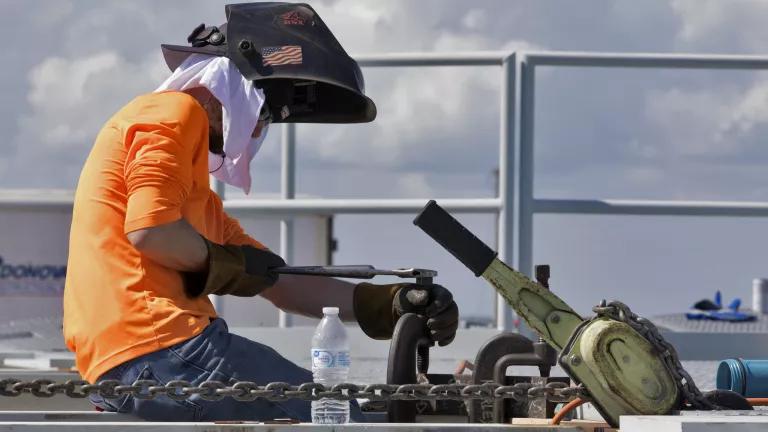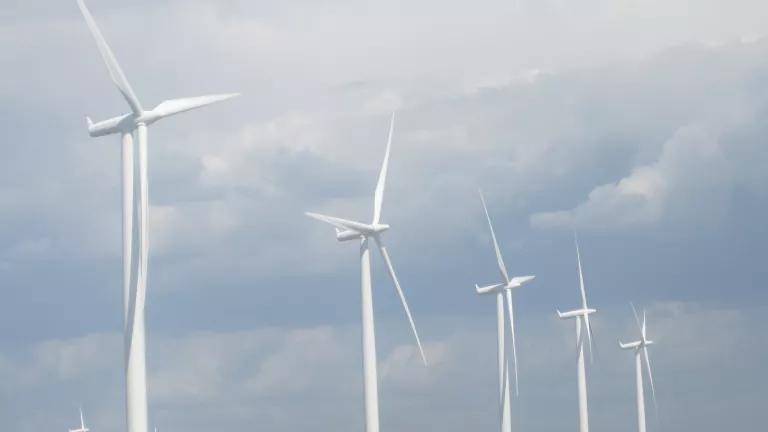What Texas Teaches Us About Good Governance
The extreme cold snap and the disaster it brought to the state is a reminder of the importance of good governance in a modern society—and the danger we court when we pursue policies untethered to the public interest.

Electrical lines running through a neighborhood in Austin, February 19, 2021
For decades, conservatives at the state, local, and federal levels have worked to gut the commonsense safeguards we all depend on to protect our health, safety, environment, and economic security. At base, it’s always been about one thing: putting corporate profits first, even while putting the rest of us at risk.
Few places, if any, have gone farther down this road than Texas. Now its people are paying a terrible price.
Texas got socked last week with record cold and a harsh winter storm. That shouldn’t have caused a humanitarian disaster and public health crisis that left millions of people without power, heat, or clean water in freezing weather.
One reason it did is because the conservatives who have long controlled the state government stripped out the responsible public oversight the people of Texas have a right to expect from their government.
It’s a reminder of the importance of good governance in a modern society—and the danger we court when we pursue policies untethered to the public interest.
Texas had been warned.
Ten years ago this month, 4.4 million Texans were left without power at one point or another over the course of three days, when an extreme cold snap similarly crippled much of the state’s electric system, when critical equipment froze, gas production was curtailed, and limited supplies were directed to priority residential, hospital, and related needs.
State, regional, and federal agencies looked into the reasons. In a 357-page report, the Federal Energy Regulatory Commission cited the need to increase the amount of reserve electricity generation capacity in the Texas system, add more emergency generators that could reliably function in harsh weather, and better protect critical equipment for winter.
These are exactly the kinds of measures that state public utility commissions routinely allow power companies to pay for through electricity rates. That’s one reason rates are regulated in most states, so that power companies may recover the costs of investments required to maintain and upgrade equipment. Customers benefit from greater reliability.
The Public Utility Commission of Texas, city councils, and cooperative governing boards set rates for about a quarter of the state’s customers. The rest, about 75 percent, purchase electricity from retailers in a competitive market where prices are driven by supply and demand.
By itself, the market provides no immediate payback for making such investments, and so Texas power companies, by and large, haven’t adequately done so, University of Houston energy fellow Ed Hirs told the Houston Chronicle. The Texas grid “has collapsed in exactly the same manner as the old Soviet Union,” said Hirs. “It limped along on underinvestment and neglect until it finally broke under predictable circumstances.”
Even so, Texans could have been spared this disaster had Texas not been the only state in the continental United States to shun participation in the regional power pools overseen by the Federal Energy Regulatory Commission. “Texans would [rather] be without electricity for longer than three days to keep the federal government out of their business,” said former Texas Governor Rick Perry, who served as U.S. Energy Secretary in the Trump administration.
With more than 40 Texans dead from the cold and the toll continuing to climb, it wasn’t clear exactly who Perry was speaking for, but this is what he was trying to explain: Most of Texas—apart from the far eastern part of the state and a small part of the west—is, by choice, not linked to other power grids in the region. As a result, Texas wasn’t able to call on nearby states for additional electricity when the crunch hit.
Why not? Operating a self-contained grid allows Texas to avoid regulation by the Federal Energy Regulatory Commission at, it turns out, a tragic cost to the people of Texas.
Pooling electricity in regional grids strengthens the whole. It provides a way for power companies to sell electricity across state lines when conditions, like emergencies, call for it. Had Texas been a part of either of two such power pools in its region, it could have purchased needed electricity when demand spiked and local systems failed. Instead, more than four million Texans lost power—many of them for several days—during some of the coldest weather in generations.

People in Houston waited in line for more than an hour in the freezing rain to fill their propane tanks, February 17, 2021.
It could have been worse: The independent Texas power system very nearly collapsed entirely.
When the system failed last week, the conservative aversion to even a modicum of public oversight came back to bite Texans in the wallet, with residential customers getting hammered with electric bills as high as $17,000.
That’s not a typo.
State public service commissions strive to regulate electricity rates through sound economic analysis meant to allow power companies to earn a reasonable return on appropriate investments, costs, and expenses, while providing customers with reliable electricity at a stable price.
Those protections weren’t in place last week for the three-fourths of Texans who buy their electricity at market rates. When supplies tanked just as demand for heating shot up, prices went through the roof. That left Texans competing with each other for increasingly high-priced electricity, like commuters watching Uber rates soar at rush hour.
When only the highest bidder gets power just as it’s needed the most, it’s low-income communities and people of color who suffer worst. That’s exactly what’s happening in Texas, a tragic illustration of the environmental injustice and economic inequity that’s intolerable to a society that values justice.
The electricity failure, in turn, led to water shortages that left, at the height of the crisis last weekend, 14.9 million Texans without access to clean water, widening the public health and safety disaster and, again, putting the most vulnerable of Texans at greatest risk.
Don’t hold your breath waiting for the conservatives who locked Texas into this bind to come clean. For the most part, they’ve taken to falsely blaming the crisis of their making on renewable power instead of the gas-, coal-, and uranium-powered systems that accounted for 80 percent of the problem. Those of them, that is, who didn’t flee the state.
Our society functions best when market systems are augmented by good governance, to ensure that short-term corporate profits don’t come at the expense of public safety and health or at the price of personal financial ruin. We have the right to count on our elected officials to help safeguard those interests the markets can’t ensure, and to protect us from markets that put us at risk.



